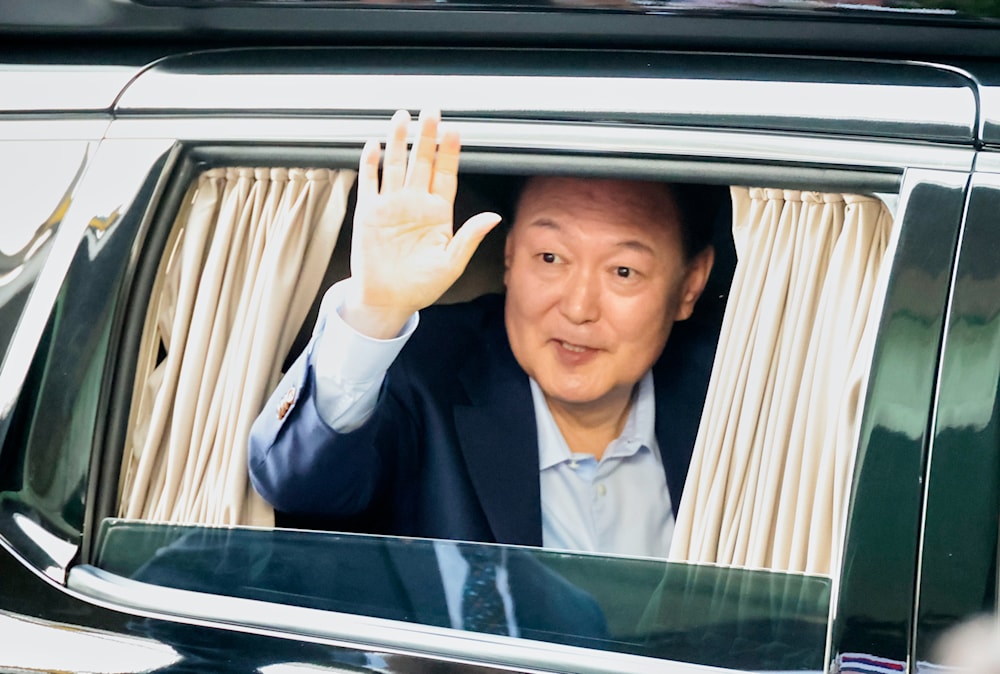South Korea's former president denies insurrection in criminal trial
The South Korean president denied the allegations against him, but legal experts note that previous rulings could set damaging precedents for the ousted leader.
-

South Korea's ousted president Yoon Suk Yeol waves to supporters as he leaves his official residence in Seoul, South Korea, Friday, April 11, 2025. (AP)
Former South Korean President Yoon Suk Yeol appeared in court Monday for the first day of his criminal trial regarding his martial law declaration, where the impeached leader denied allegations of insurrection.
Yoon faces insurrection charges related to his failed martial law declaration, but his legal team rejected all allegations, leading the former president to take the stand and personally defend his actions, "To frame an event that lasted only a few hours, was non-violent, and immediately accepted the dissolution request from the National Assembly as insurrection... strikes me as legally unfounded," Yoon told the court.
According to pool reports, Yoon—a former prosecutor himself—requested that the court project the prosecution's presentation on a monitor, then systematically addressed and countered each argument in their opening statement.
Prosecutors alleged that the former president "planned to incite an uprising with the intent to subvert the constitutional order," presenting evidence such as his premeditated martial law preparations, the deployment of military forces to parliament, and his orders to breach windows and cut power supplies.
Legal marathon begins
Prosecutors will present testimony from two military officers, one of whom alleges that top commanders ordered him to forcibly remove lawmakers from the National Assembly in order to enforce the martial law declaration.
Lawmakers resisted armed troops by scaling fences to convene in parliament, where they voted to reject Yoon's martial law declaration—prompting his swift reversal of martial law within hours.
Legal experts anticipate a protracted trial, with attorney Min Kyoung-sic telling AFP that while an initial verdict could come as early as August, the massive volume of evidence—approximately 70,000 pages—combined with multiple witness testimonies could prompt the court to extend proceedings if necessary.
The case of former president Park Geun-hye illustrates how such proceedings can unfold over years, as her December 2016 impeachment was followed by a legal process that continued until the Supreme Court finalized her influence peddling and corruption sentence in January 2021.
Legal experts note that a guilty verdict would make Yoon the third South Korean president convicted of insurrection—following two military leaders tied to a 1979 coup—with attorney Min suggesting the precedent might apply given similarities in the alleged coercive military deployments.
Yoon faces potential life imprisonment or even the death penalty if convicted of insurrection, but the death penalty is highly unlikely to be carried out as South Korea has had an unofficial moratorium on executions since 1997.
The wider context
The political crisis erupted when Yoon’s martial law order stunned the nation, leading to his swift impeachment by lawmakers. Prime Minister Han was also impeached, though the constitutional court later reinstated him. He will remain in the role of acting president until voters elect a new head of state.
The power vacuum has cast a shadow over Seoul’s response to escalating economic pressures, including heightened US tariffs and a regional slowdown, amid tense dealings with US President Donald Trump’s administration.
Lee Jae-myung, the populist liberal leader of the Democratic Party who narrowly lost to Yoon in 2022, is currently the front-runner, though he remains entangled in several legal battles, including charges of election law violations and bribery.
The conservative People Power Party, reeling from Yoon’s downfall, now faces a wide-open race. Labour minister Kim Moon-soo declared his candidacy on Tuesday, emerging as the party’s most prominent contender.
It is worth noting that a Gallup Korea poll published on April 4 showed 34% of respondents favouring Lee for the presidency. Kim Moon-soo followed with 9%, ahead of former party leader Han Dong-hoon at 5%, Daegu mayor Hong Joon-pyo at 4%, and Seoul mayor Oh Se-hoon at 2%.

 4 Min Read
4 Min Read










